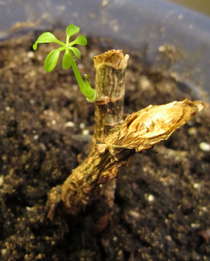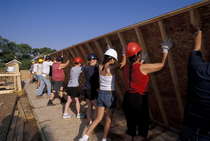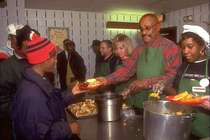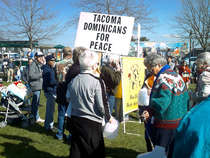PHOTOS:Mary van Balen
My daughter and I have shared caring for her plant (a schefflera) for years since since she is, in her words, “a nomad.” Such is the plight of an archaeologist. I did not mind, but worried when leaves turned yellow and dropped or an attack of some pest or other threatened to bring its end. Once I cut off healthy stems, rooted them, and carried the rest to the compost pile.
Most recently, after an unusually vicious attack by bugs, I cut the stems off at almost dirt level, and took them with me to my daughter’s new apartment since she would probably be able to stay there for a couple of years. I intended to dump behind the garage what remained and then dispose of the pot since none of my efforts had eradicated the bugs.
I never got around to that, and the other day when I walked through the spare bedroom where it was kept, I was surprised to see tiny green “umbrella” leaves sprouting form the stump. Of course, I thought of this passage from Isaiah that begins: “On that day a shoot shall sprout from the root of Jesse…”
What seems to be dead still holds the sap of life and can give birth again. I love today’s Old Testament reading, full of rich images and unlikely scenarios: a lion lying down with a lamb; a child playing in a cobra’s den; the lion become a vegetarian, eating hay like an ox. (My vegan sister-in-law would love that!)
These pictures adorn Christmas cards and find their way into songs and poetry. They show the world we long for, a world of no hurt or pain, “no harm or ruin on all my holy mountain,” as the prophet says. We will be filled only with the knowledge of the Lord, drowning in its glory just as the water covers the sea.
We may feel spent, our energy gone, our hopes dashed. We may battle demons of depression and mental illness. We may be physically sick or unemployed. Our spirits may seem dead with us. But the juicy sap of God’s self still flows somewhere in our depths, persevering the possibility of life in our darkest, driest times.
Like the child in Isaiah’s magnificent verses, we cannot judge by appearance, but instead can know that God wills good for us and is able to bring it about no matter how impossible that seems.
Sometimes, when we are at our lowest point, we cannot bear to hear such good news because our own suffering overwhelms us. There is no room inside us for joy or hope. Too often we have allowed ourselves to dream only to have our dreams dashed to nothing.
God’s Mercy does not abandon us, even in those times. It remains and will surprise us with something good when we least expect it, like the little schefflera leaves surprised me. 


 And when he saw the crowds he felt sorry for them because they were harassed and dejected, like sheep without a shepherd. Then he said to his disciples, The harvest is rich but the laborers are few, so ask the Lord of the harvest to send laborers to his harvest.
And when he saw the crowds he felt sorry for them because they were harassed and dejected, like sheep without a shepherd. Then he said to his disciples, The harvest is rich but the laborers are few, so ask the Lord of the harvest to send laborers to his harvest. Who wouldn’t be overwhelmed? Easier to stay home cocooned in one’s close circle of family and friends and let the world fend for itself. We have enough problems of our own. After all, what difference can one person make?
Who wouldn’t be overwhelmed? Easier to stay home cocooned in one’s close circle of family and friends and let the world fend for itself. We have enough problems of our own. After all, what difference can one person make? Where is integrity? Leaders who are looking out for the poor? Tax breaks for millionaires? Cut backs in programs that provide for the most vulnerable? Stalling on nuclear arms treaties?
Where is integrity? Leaders who are looking out for the poor? Tax breaks for millionaires? Cut backs in programs that provide for the most vulnerable? Stalling on nuclear arms treaties?  I know the plans I have in mind for you it is the Lord who speaks plans for peace, not disaster, reserving a future full of hope for you. When you seek me you shall find me, when you seek me with all your heart. (from Mid-morning reading, Terce – Jeremiah 29:11,13)
I know the plans I have in mind for you it is the Lord who speaks plans for peace, not disaster, reserving a future full of hope for you. When you seek me you shall find me, when you seek me with all your heart. (from Mid-morning reading, Terce – Jeremiah 29:11,13)  Be patient, brothers, until the Lords coming. Think of a farmer: how patiently he waits for the precious fruit of the ground until it has had the autumn rains and the spring rains! You too have to be patient; do not lose heart, because the Lords coming will be soon. The Judge is already to be seen waiting at the gates.James 5:7-8,9
Be patient, brothers, until the Lords coming. Think of a farmer: how patiently he waits for the precious fruit of the ground until it has had the autumn rains and the spring rains! You too have to be patient; do not lose heart, because the Lords coming will be soon. The Judge is already to be seen waiting at the gates.James 5:7-8,9 “On this mountain the Lord of hosts will make for all peoples a feast of rich food…And he will destroy on this mountain the shroud that is cast over all peoples…Then the Lord God will wipe away tears from all faces…Let us be glad and rejoice in his salvation for the hand of the Lord will rest on this mountain.” Is 25:6a,7a,8a9b.10 (from today;s Mass readings)
“On this mountain the Lord of hosts will make for all peoples a feast of rich food…And he will destroy on this mountain the shroud that is cast over all peoples…Then the Lord God will wipe away tears from all faces…Let us be glad and rejoice in his salvation for the hand of the Lord will rest on this mountain.” Is 25:6a,7a,8a9b.10 (from today;s Mass readings) Jesus was walking along the sea of Galilee and saw two fishermen casting their nets out for a catch. He called to them and asked them to leave their nets and follow him and he would make them fishers of men.
Jesus was walking along the sea of Galilee and saw two fishermen casting their nets out for a catch. He called to them and asked them to leave their nets and follow him and he would make them fishers of men. Unexpected activity on the homefront resulted in my arriving late for Mass,and I walked in while the celebrant was delivering his homily.
Unexpected activity on the homefront resulted in my arriving late for Mass,and I walked in while the celebrant was delivering his homily.  This year’s Advent wreath reflects the non-traditional path I have been traveling and the beauties to be found in it. Many of my belongings are packed away and I was not sure what kind of wreath would mark the weeks of Advent. After unsuccessfully looking for the perfect blue and rose colored candles or candle holders, I decided to use what was at hand instead.
This year’s Advent wreath reflects the non-traditional path I have been traveling and the beauties to be found in it. Many of my belongings are packed away and I was not sure what kind of wreath would mark the weeks of Advent. After unsuccessfully looking for the perfect blue and rose colored candles or candle holders, I decided to use what was at hand instead. Jesus is re-born in each of us and will bring all things to oneness with Him and with The One Who Sent Him. Advent celebrates what was, what is, and waits expectantly for what is to come. As I ponder the events of the past year and of my present place, I know that we are called to do the same.
Jesus is re-born in each of us and will bring all things to oneness with Him and with The One Who Sent Him. Advent celebrates what was, what is, and waits expectantly for what is to come. As I ponder the events of the past year and of my present place, I know that we are called to do the same. I live in the house where she and dad raised my four silblings and me. I sit on their couch, launder clothes in the washer she’d used for years and gaze out the dining room window, watching squirrels scamper up and down the grand pin oak in the front yard. Just like mom did, and her mother before her. Over the past two years since she died, many things remind me of her and I miss her face, her hugs, her love.
I live in the house where she and dad raised my four silblings and me. I sit on their couch, launder clothes in the washer she’d used for years and gaze out the dining room window, watching squirrels scamper up and down the grand pin oak in the front yard. Just like mom did, and her mother before her. Over the past two years since she died, many things remind me of her and I miss her face, her hugs, her love. Not that I doubt that it will or that I haven’t had Thanksgivings without the entire family gathered around the table, but this year is different. The separation is finally legal. A good thing.”
Not that I doubt that it will or that I haven’t had Thanksgivings without the entire family gathered around the table, but this year is different. The separation is finally legal. A good thing.” She was pleased to see her daughter carrying on traditions she had passed along and reminded me that chilling the crusts and crimping their edges was an improvement. I could almost feel her arm around me and knew it was her whisper that reassured me: “Everything will be good in the end.”
She was pleased to see her daughter carrying on traditions she had passed along and reminded me that chilling the crusts and crimping their edges was an improvement. I could almost feel her arm around me and knew it was her whisper that reassured me: “Everything will be good in the end.” Yesterday was a struggle. Perhaps, as my spiritual director suggested, this year’s holiday season will be difficult. When she mentioned that a week ago, I was quick to respond: “Oh, I don’t think so. I have been living on my own for close to two and a half years. Besides being legally recognized, not much has changed. I’ll be fine.”
Yesterday was a struggle. Perhaps, as my spiritual director suggested, this year’s holiday season will be difficult. When she mentioned that a week ago, I was quick to respond: “Oh, I don’t think so. I have been living on my own for close to two and a half years. Besides being legally recognized, not much has changed. I’ll be fine.”